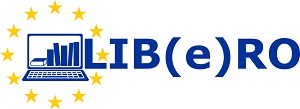Project Contents
Helping minor refugees getting started in Europe, learning a new language and finding their own way in a new social and cultural context – this is the aim of setting-up an e-learning-platform within project LIB(e)RO.
To further the integration of minor refugees, the project partners from Austria, Germany and Greece aim at making use of the potential of libraries as socially inclusive learning spaces, which provide ideal conditions for language acquisition as well as intercultural understanding. Within the frame of the project, networks between libraries will be established and librarians as well as social workers will be offered the opportunity to receive additional vocational qualification via an online-platform. They will be able to learn more about the socially inclusive learning approach and how to promote and accompany socially inclusive learning in their libraries. At the same time, the project will offer first learning units for minor refugees, which they can use to take first steps into a new language and society.
For an overview of all relevant information concerning our project, please also take a look at our brochure.
In the current debate about refugees, minors occupy a special position, as they are still one of the most vulnerable groups. Many of them are traumatized by the experiences in their home countries and the chaotic conditions during their journey and therefore feel defenceless. Especially unaccompanied refugees face the risk of disappearing. At the end of January 2016, as reported by EUOPOL, at least 10,000 children are missing (dpa, 31/01/2016). Consequently, there is the need to establish structures, in entry as well as host countries, which will help traumatized minors and prevent that they flee underground for fear of deportation or arrest. At the same time, there is the need to support their start into a new culture and life in Europe. For this, it is essential that minor refugees are able to acquire first language competences as well as an intercultural understanding of European society.
The aim of project LIB(e)RO is helping minor refugees getting started in Europe, learning a new language and finding their own way in a new social and cultural context. In order to realise this aim, the project draws on the potential of libraries as learning spaces and offers librarians as well as social workers the opportunity of additional vocational training in this regard. Via the LIB(e)RO online-platform they will be able to learn how they can establish their libraries as secure and socially inclusive learning spaces, e.g. by organising their respective libraries accordingly or accompanying parts of the youths’ learning process themselves.
Project LIB(e)RO aims at involving two different groups: on the one hand librarians and social workers, on the other hand minor refugees. Within the frame of the project, librarians and social workers will be offered the opportunity to receive additional vocational training. The material offered on the LIB(e)RO website as well as the online-tutorial will enable them to e.g. organise libraries in a way conducive to socially inclusive and intercultural learning or to accompany parts of the learning process of minor refugees. Minor refugees, then, are the second group the project wants to involve. LIB(e)RO aims at supporting their smooth start into a new language and society by providing them with learning material and appropriate learning space. Thereby, they will be able to improve their language competences and to start developing an intercultural understanding of social structures and customs in Europe.
LIB(e)RO is a project developed and implemented by a team of project partners from Austria, Germany and Greece. Alongside Danube-University Krems in Austria, which is responsible for the coordination of the project, the University of Passau (Germany) acts as strategic partner. Furthermore, a number of operative partners are involved in the implementation of the project: komm.bib (Association of Community Libraries in Lower Austria), WIFO (Economic Forum of the region of Passau), the National Library of Greece (NLG) as well as the public library of Leros.
The project title “LIB(e)RO” combines Latin word “LIBER” for book and “LIBERARE” for freeing by the small “-e” as a symbol of the online learning platform into the verb “LIB(e)RO” (I free, I discard, etc.). Books that are combined with socially inclusive education, embedded in a powerful digital educational landscape, enable young people to process their experiences and to “liberate” themselves by allowing them to develop and take up learning paths for themselves.



